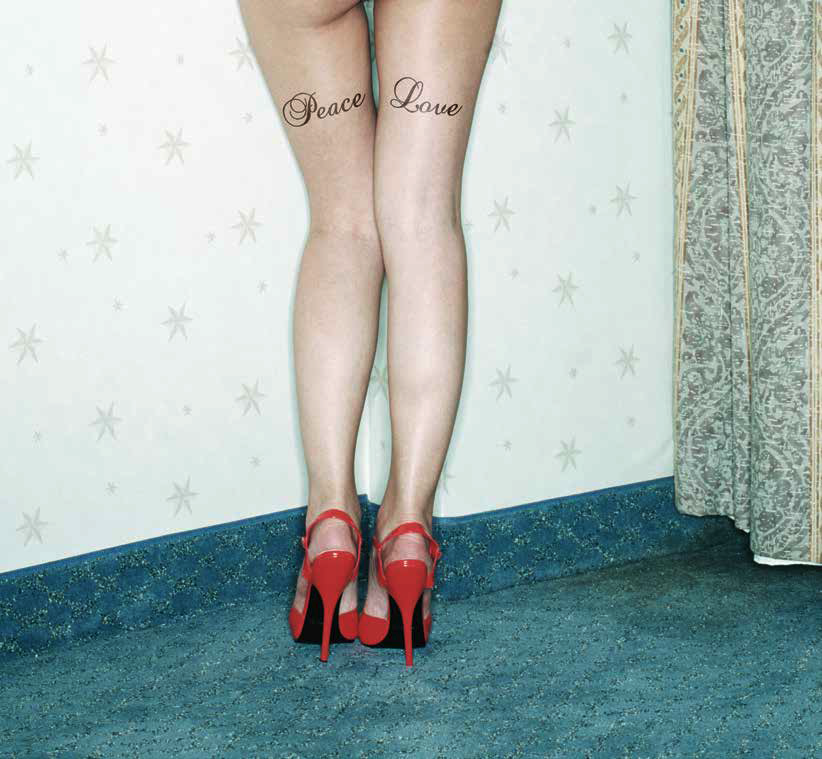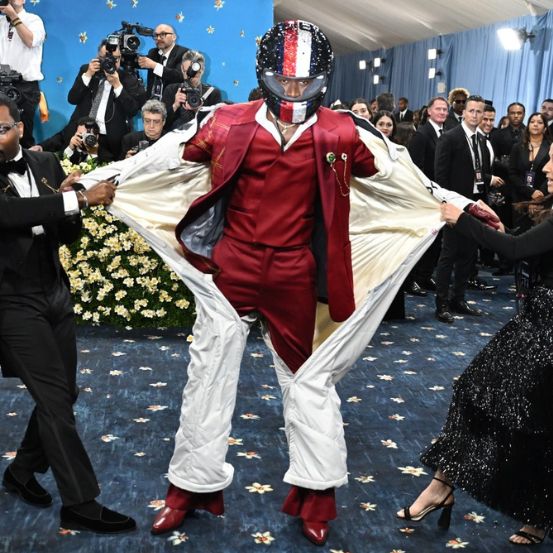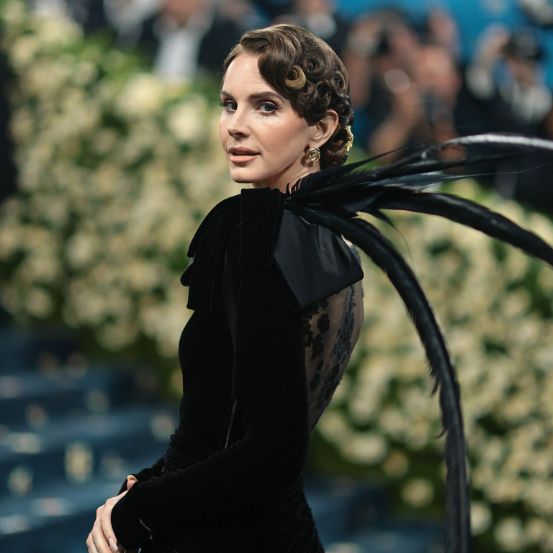From “amor de mãe” to “blessed”, tattooing a quote, word, phrase, lyric, in whatever language, is to make the body an (but not always) open book.
It wasn't tattoos that the American writer was referring to in this quote, but in this context it might as well be. From “amor de mãe” to “blessed”, tattooing a quote, word, phrase, lyric, in whatever language, is to make the body an (but not always) open book. A diary that may even have commonplaces and recurring mantras, a couple of regrets even, but which will always be a page for freedom of expression — and sometimes a cry for empowerment.

© Getty Images
When Phil Dunphy (Modern Family) thought about getting a tattoo, he shared his train of thought: it had to be on a part of the body that wouldn't age over the years and that could be hidden for professional reasons. And he had the perfect spot to tattoo the expression that best characterized him, one that in a few words reflected “I don't think small, I don't do things halfway, I'm not afraid to take risks.” And so, there, right at the end of his back, he would tattoo “Go deep.” No, bad idea. “All in.” Neither. Damn it. The tattoo was left unfinished (we deduce), but many others, other than this one, other than his, weren't. There are a couple of inferences that we can perhaps draw from the Phil-osophy of the character from Modern Family, although they may not be applied to all tattoo motivations: one is that when looking for phrases, quotes, words, expressions to tattoo on one's body, one assumes that there is some connection between the person getting the tattoo and the mantra to be tattooed; another is that you may not always get the ideal battle cry right — but that at some point in your life it made sense. “When you have your tattoo, you feel closer to your body”, explained Joseph Pierre, professor of Health Sciences at the University of California, in an interview to The Guardian, from July of last year: “Tattoos often tell an important story through art that is not expressed in words.”
And sometimes (many times) it is. In our own words, in those of other authors and moreover. The cliché “Amor de Mãe” became such because it was one of the most tattooed by Portuguese soldiers during the Colonial War, says the book Guerra na Pele - As Tatuagens da Guerra Colonial (2019), by João Cabral Pinto. The author says that the ink served as a form of revolt or mourning for comrades — and highlighted, in an interview with Público published in 2019, a mixture of very personal and intimate motivations and politics. Which is not to say that this is a rule, that tattooing text implies context. There are those who use them just for for the beauty of the phrase, for art, but despite the list of arguments being really heterogeneous, there are some choices of syntax that, popular or not, are well known: for example, surely you know someone who once tattooed the name of a girlfriend or boyfriend. “More married people than boyfriend or girlfriend”, points out tattoo artist Hugo Makarov, known for his illustrations (namely his freehand style drawn directly onto skin) more than for his quotes and words. Which doesn't take away from him any authority on the subject, as a renowned tattoo artist in the industry. “But children's names win”, he admits, adding that the cover-up (that is, covering up a previously made tattoo) happens, in cases like these, “often… too often. But it's not always the names, it's even drawings that remind people of exes that are covered up... just the knowing why they're there." Indeed, in a 2018 study commissioned by Stephen Crabbe, a linguistics expert at the University of Portsmouth, a third of men and a quarter of women confessed to regretting permanently recording someone's name. Dr. David Zweiback, a doctor and tattoo removal specialist, later confirmed in a 2019 interview that in his experience, removing names is one of the most frequent requests. But a part of those who regretted it also confessed not wanting to remove it, preferring to cover up or even keep the tattoo, claimed the same study. At Arca Tattoo Parlour, they corroborate that there are still a lot of people asking for names. Bela Hilário, Gonçalo Santos, Igor Gama and Nicole Lourinho differ in their style of tattooing, but they enjoy a common trait: they are all references in the world of tattooing. And they came together to answer Vogue's curiosities all at once. “Most of the time we don't ask who is behind the name. They're personal, concerning each one”, adding that the type of cover-up that is most often asked of them has to do with “trying to improve or cover up old tattoos that technically were not very well done.” The experiences and repplies will be different because the theme itself is too: the importance of a phrase or excerpt from a book, music, whatever, for each one, is as varied as each person's context, and the possibilities are countless. There is a little bit of everything, because we are all different and it's difficult to make or find a ranking of recurring words or a top 10 for quotes. The “amor de mãe” gained commonplace status at a less popular and less widespread time of tattooing, in a context with homogeneous traits: comradeship, the war situation, etc. Today, on the other hand, the hypotheses are almost infinite and broadcast. “In a 20-year career, I have tattooed a little bit of everything, from names to texts, prayers and promises, whether they are love or hate, the carpe diem, texts in Arabic or Chinese, more recently Hindu or in runes, are also normal, in an attempt to hide the real theme…”, shares Makarov. In fact, motivations can be so variable that it becomes difficult to argue why this or that phrase is tattooed, or to point out a preponderance of one to the detriment of another: “It's not because it's a word that ends up having more meaning, maybe there are even more people nowadays tattooing words for the aesthetic sense than illustrations, the commitment required is lower, because they are usually smaller tattoos and, at this moment, they are more fashionable”, points out Arca. But our interviewees (both the quartet and Makarov) generate consensus in an answer: “Saudade” seems to be a popular word for tattooing. “There was a time when [the most common word] was 'saudade'”, admits Hugo - “and it carries on, I think we are a nostalgic people.”
“Tattoos are always demonstrations of power, strength, decisions. You make a decision for life; even if you cover it after a while, when you ink a text, a prayer, there is always a declaration of strength and determination. (…) I have four tattooed phrases and two words, all with the same importance today as the day I made them” - Hugo Makarov.
Now that we've opened Pandora's box on what concerns television references, let's go back to another renowned sitcom: in The Big Bang Theory, Sheldon Cooper discovers that Penny has a tattoo he's never seen before. A Chinese symbol that intrigues him: “Why do you have ‘soup’ tattooed on your right buttock?”. "It's not 'soup', it's 'courage'", she replies. Courage was not what the tattoo said, but it took courage to tattoo in a foreign alphabet without expert confirmation. Does one still dare like that, in the age of automatic translators? “We still get a lot of tattoos in alphabets that aren't our own. However, if the client is using Google Translate as a translation tool and not a certified translation, we always warn them about the possibility that the translation is wrong, then it's done at their own responsibility”, warns Arca Tattoo Parlour. Hugo Makarov believes that “normally, when there is a desire to draw foreign letters or languages, the client is the first to make sure that there are no confusions, like tattooed Chinese letters that say 'vegetable chau-min' instead of 'true love', so my job is always easy, but I usually tattoo in Portuguese or languages that I master relatively (ah ah) well." Regardless of the language, tattooing a word, due to the imperative of being perceptible over the years, may require some attention to certain guidelines: “Depending on the location of the body to be tattooed and the font, we always advise the client in order to have the best possible tattoo for as many years as possible, bearing in mind that the tattoo ages, just like the skin”, warns the fantastic foursome from Arca. “I try to adapt the size of the lettering a little to the place and the theme… everything ends up being important, detail, size, area of the body… You can't make miniatures that after a while you won't notice and even disappear…”, corroborates Makarov . “I often do my own version of the proposed lettering, I rarely use net or computer fonts.” About the place in the silhouette where life mottos and other sayings are tattooed, the thing can be quite random, as the Arca team attests. But, although it varies a lot from person to person, “above all, the more personal or stronger the word/phrase/name, the more hidden it is…” says Hugo Makarov. According to his experience, the tattoo artist adds that, for example, “when it's names of children, grandparents, people who have died, they do it on the arms, in plain sight; when it's more personal things, decisions, names of people (dating or marriage) are always in more hidden areas, like ribs and back.”
Maybe because they seem like a secret, a reminder, a memo, a love note that only concerns us and that doesn't need to be shared with the world... a part of the diary that we imprint on our body and that is relatively locked away. But accessible or not, more or less visible, for aesthetic reasons or with greater or lesser significance, writing on the skin does not go unnoticed neither to others nor to ourselves – mainly to ourselves, in a profound way. In that aforementioned interview with The Guardian last year, psychologist Viran Swami, who focuses on body image, despised the idea that a tattoo is just a trend, “given its permanence, the pain factor involved and the planning that often requires getting a tattoo, it's very difficult to conceive this art form as a fashion accessory”, adding that it is much more interesting to examine the way in which this kind of illustrating the body is used as a personal achievement, an artistic process as an expression of identity, a way to claim the body as yours and a form of personal growth. And from this angle, writing lines as a motto of life, a word of strength, can be beneficial for mental health, as daily affirmations hidden in plain sight, as a source of inspiration printed forever as a reminder of empowerment or simply to honor someone or an important milestone in life. According to the paper, over the last decade, this psychologist has conducted a series of comparisons between the personalities of people with and without tattoos, finding that the old stereotype that tattooed people would have more anger issues or be more impulsive may have a background of true, but the differences are so residual as to be unremarkable. One of his most curious studies has to do with comparing the body perception of each person before and after tattoos: he noticed that anxieties about appearance and the general feeling of dissatisfaction with their own figure practically disappeared after tattooing themselves, being that the boost in self-esteem was still evident several weeks later, confirming that the effect was not the result of a momentary euphoria linked to the occasional act of tattooing. Even if the meaning changes over time, the memory is not lost. “Tattoos are always demonstrations of power, strength, decisions. You make a decision for life; even if you cover it after a while, when you ink a text, a prayer, there is always a declaration of strength and determination. (…) I have four tattooed phrases and two words, all with the same importance today as the day I made them”, concludes Hugo Makarov. And it may not even be imperative to tattoo a phrase for any reason other than the beauty of an expression or a word, but you should at least believe in what you are “printing” on your skin: “There was a customer who asked us to tattoo 'finish everything you start', but didn't finished the tattoo”, tells us Arca Tattoo Parlor.
Originally translated from Vogue Portugal's The Quote Issue, published April 2022.For full credits and stories, check the print version.
Relacionados


Para além do espelho: tudo o que precisa de saber sobre procedimentos estéticos
07 May 2025



.png)

.png)
